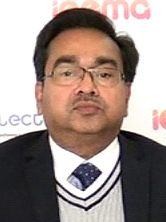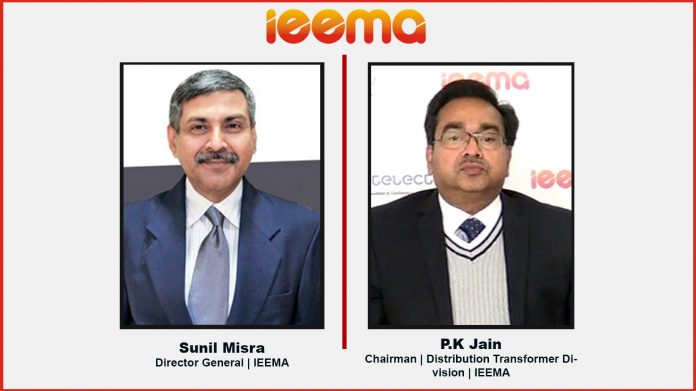ELE Times: The government is planning to expand the power generation capacity to 400 GW by 2022, so how equipped are the manufacturers to supply these instruments?

Pawan Kumar Jain: As far as India is concerned, we are very well equipped to meet the coming forecast demand of Government of India by 2022. In India all the industries in last three-four years have geared up and enhanced their capacity. If there is a proper commitment from the GoI, I can guarantee that the manufacturers in India are capable enough to meet the commitments.
ELE Times: What is your take on the technology availability and the technology at par with the international standards?
Pawan Kumar Jain: I would say that Indians are conservative and meticulous while adopting new technology. So we must give it some time for it. International companies might be one or two year ahead of us but we are not far off.
ELE Times: There has to be a level-playing competitiveness in the international and Indian industries, so are you happy with the present plans of the government?
Pawan Kumar Jain: From IEEMA platform we have been always been giving our inputs to the Power Ministry that there is a lot of modernization to the grid which is electronically controlled. There we say we must have a conservative view on the international participation because there is a big challenge on smart equipments with a lot of hacking involved. We are putting this to the Ministry that there should be a conservative view regarding adaptation of these electronics.
ELE Times: Everything is moving towards becoming Smart, so what is the state of affairs in the electricity manufacturing industry and what are the challenges faced?
Pawan Kumar Jain: One of the biggest challenges today in smart electricity is, educating the down-the-line people. In India, the lowest tail-end person is a line-man; from there we have a junior engineer, and then a system engineer. The education and knowledge sharing program and its adoptability for the workers is still need to be made stringent,
ELE Times: What about the technology up gradation that will enhance the power generation?
Pawan Kumar Jain: We are almost coming close to the industrial standard and GoI along with the top decision makers, are very much open for latest technologies in smart grid. For example take the meters, where we are now to stall smart meters. But at certain point there are resistances from the people who are resisting because of lack of knowledge. If you have a program for sharing the knowledge and upgrading these platforms then definitely acceptability will increase.
Sunil Mishra: Today India is a leader in smart meters and Indian companies are supplying to European and Australian utilities, which demand the latest and the best technology. The latest technologies that are prevalent in the world are either used or about to be used in India.
ELE Times: How much time will it take for the industry and the government to curtail the power theft as we are already losing 10 lakh crore in the process?
Pawan Kumar Jain: Already GoI has taken a good number of steps and the success stories have started coming in with many DisComs coming into profit. IEEMA has recently honored a sarpanch from a remote village of Rajasthan, who has brought her village to zero-theft.
ELE Times: Where does the major problem lies?
Pawan Kumar Jain: The biggest problem is the political will. If there is a strong political will to reduce the theft the financial loss of the electricity can be brought down. Power in India is used for vote by politicians who need to be stopped.
ELE Times: How confident you are on the Modi Government and the policies?
Pawan Kumar Jain: I am pretty confident and positive that very shortly big change will be witnessed as per as the power sector is concerned and again there is one more step which has been taken by GoI, where they have given a financial package to all the utilities in India where losses of certain amount is subsidized or removed by a different model and so the interest part of what you are paying on that loans will be removed.
ELE Times: What is the state of affair in having the in-house R&D facilities in the companies and how are they doing in that sector?
Pawan Kumar Jain: India is doing rather extremely well. The entire industry is very well equipped in Research and Development and very much focused.
ELE Times: You also need equipments for generation process, so is it being sourced from outside or it is being indigenously manufactured here in India?
Sunil Mishra: It is both, in the sense that there is the indigenous technology being developed, and of course there is a portion of technology being brought from outside, or being bought in by multinationals to manufacture here. I would personally like to see the industry investing at least 1% in R&D for future needs so that more and more indigenous technology are developed and not bought from outside.
ELE Times: Is there any challenge related to the skilled labour in the industry?
Pawan Kumar Jain: Yes it is. It is true that we have less qualified workers, in which we need to look into. Our IITS, NITs, and bottom line where workers are being trained. I think there is a scope of lot of improvements. And GoI have already brought this into notice, as even the Prime Minister of India is talking about Skill India. We need skilled workers for quality products to be produced.
ELE Times: What are the challenges that you are facing in the export sector and hope you are coping with it efficiently?
Pawan Kumar Jain: There we would say are real hardship and we need a lot of intervention from the Ministry of Power. IEEMA has already taken up two-three issues, one of them is the recognition of the indigenous R&D centers that our testing labs, like Central Power Research Institute (CPRI), our Research institutes, Indian Renewable Energy Development Agency Ltd. (IREDA), their certifications are not being accepted by even Gulf countries, Nepal, Sri Lanka and many African countries. The credentials has to be improved and we have to become at par with internationally acceptable testing houses.
ELE Times: What is the real issue credential or quality?
Pawan Kumar Jain: We have to improve the quality of the product as well as the credentials, along with the infrastructures to be able to compare it internationally.
Sunil Mishra: We have recently approached the Ministry of External Affairs and the Ministry of Commerce and a got a meeting conveyed in the Ministry of Power. Consequent to that the Ministry of External Affairs wrote to its missions, so that the ambassadors and high commissioners are able to take it up with stakeholders in that country. So we are hopeful that some of these efforts will yield results.
ELE Times: Would you like to throw light on the ‘Intelect 2017’ and also DistribuELEC 2017.
Pawan Kumar Jain: The Event will be on 23rd January 2017 for 3 days. The event will be inaugurated by the Power Minster, Mr. Piyush Goyal. There we are having two events one is ‘Intelect 2017’, where we are inviting speakers from India and outside. IEEE is our partner and we are going to touch many areas in this event. The DistribuELEC is about electrical equipments which are of 33kv or below. So we are inviting the manufacture to come and display their products. This will be one of the most unique exhibitions in the world.




